 So, today is the 4th of July.
So, today is the 4th of July.
We all know what that means. Picnics with hotdogs and potato salad. Maybe a baseball game. Parades. Flags. Gatherings with family and friends. Maybe a beer or two, for those so inclined, or a glass or two of Kool-Aid. And fireworks in the evening, of course.
Somewhat forgotten in all of this may be the original intent of the holiday, to celebrate our signing of the Declaration of Independence, and our break with England to form the beginnings of this great nation. Somewhat forgotten amongst all the rah rah and overindulgence may be the memory of the bravery of the men who first signed that document thus placing their own lives on the line in the name of the United States.
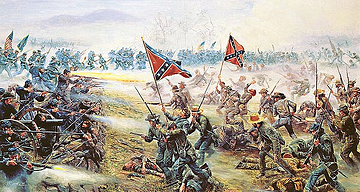 But, tucked away in the corner of our memory, almost certainly forgotten by most, is the recollection, if indeed we know at all, that on this day one hundred and fifty years ago, a great battle had just been fought leaving more than 51,000 Americans dead or wounded. A battle that took place in and around a small town in Pennsylvania, and that would forever change the way America evolved.
But, tucked away in the corner of our memory, almost certainly forgotten by most, is the recollection, if indeed we know at all, that on this day one hundred and fifty years ago, a great battle had just been fought leaving more than 51,000 Americans dead or wounded. A battle that took place in and around a small town in Pennsylvania, and that would forever change the way America evolved.
From the 1st of July, to the 3rd of July, in 1863, some 151,000 men or more took part in a landmark battle at the town of Gettysburg, Pennsylvania, deciding, by way of a pivotal conflict in a larger war, the future of this country. Would it continue as one nation or would it be split forever in two? Would it put an end to slavery or not? Would we continue as an amalgamation of small states or become one large and powerful nation, set to lead the world in the coming century? The events of these three days decided those questions once and for all, though this would not be apparent at that moment to most Americans .
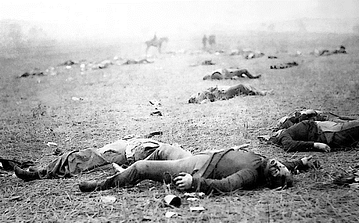 Prior to this battle, the South had enjoyed almost unlimited success in battle. Following these three days, the Southern Army was left to limp away, a scarred and broken semblance of the proud machine it had been before, and never to really recover again. The war rages on, but the conflict was decided. The Army of Virginia had lost more than a third of it's size. Nearly 13,000 rebels were wounded, another 5200 missing and between 300 and 4500 had been left dead on the battlefield. Too many resources had been expended by a Southern army which was unable to replace what it had lost. The end was merely a matter of time.
Prior to this battle, the South had enjoyed almost unlimited success in battle. Following these three days, the Southern Army was left to limp away, a scarred and broken semblance of the proud machine it had been before, and never to really recover again. The war rages on, but the conflict was decided. The Army of Virginia had lost more than a third of it's size. Nearly 13,000 rebels were wounded, another 5200 missing and between 300 and 4500 had been left dead on the battlefield. Too many resources had been expended by a Southern army which was unable to replace what it had lost. The end was merely a matter of time.
And on this day, the 4th of July, the beaten rebel force slowly crawled back across the river into Virginia. Beaten, broken and disillusioned.
Had the forces of the North pursued this rag tag group and attacked them, the entire ability of the South to wage war might have ended. But a cautious General Meade, in charge of the Union army, made the tactical decision to allow the southerners to escape, choosing instead to try to pull his own forces back together.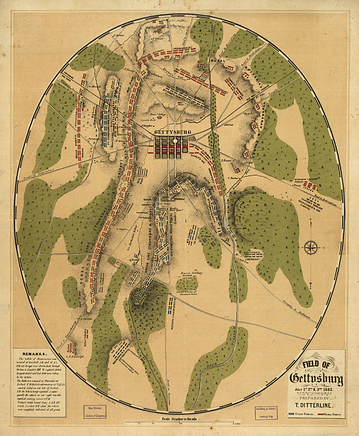
In Washington, President Lincoln, acutely aware of the mistake, contacted General Meade in the days that followed with this message:
“my dear general, I do not believe you appreciate the magnitude of the misfortune involved in Lee's escape. He was within your easy grasp, and to have closed upon him would, in connection with our other late successes, have ended the war. As it is, the war will be prolonged indefinitely. If you could not safely attack Lee last Monday, how can you possibly do so South of the river, when you can take with you very few more than two thirds of the force you then had in hand? It would be unreasonable to expect, and I do not expect you can now effect much. Your golden opportunity is gone, and I am distressed immeasurably because of it.”
Lincoln, not a military man by trade, but forced by circumstance to engage his formidable intellect in that pursuit, gauged, quite accurately, what the General could not see. That without an army the South would be done.
And so an opportunity was lost to bring that hideous conflict to an end quickly. The war would drag on for nearly two more years, and cost our nation many thousands of additional dead.
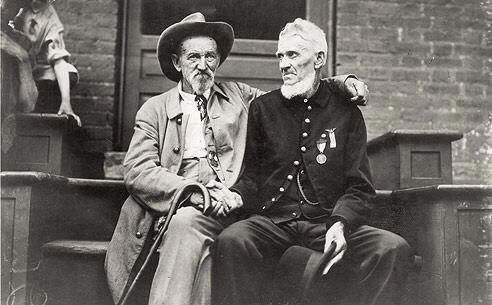 But, we pause today to remember not the strategic importance of that time, but rather the individuals who gave their lives on both sides, each individually certain that their cause was the righteous one. That theirs was the path on the right side of history.
But, we pause today to remember not the strategic importance of that time, but rather the individuals who gave their lives on both sides, each individually certain that their cause was the righteous one. That theirs was the path on the right side of history.
And as to the survivors of this mighty conflagration, what thoughts ran through their minds on this day so many years ago. Gratitude to have survived? Anger? Relief?
We can only imagine the feelings experienced by the victorious Northern boys, or by the escaping Southerners.
Both, no doubt, were glad the hell was done, if only, as they surely knew, for short while.
Words are not enough.
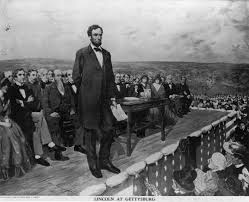 As Lincoln himself mused some months later,
As Lincoln himself mused some months later,
“The world will little note nor long remember what we say here, but it can never forget what they did here.”
Or, at least, so we hope.
So, as you down another hotdog today, and root for your favorite slugger to pump out another home run, take a moment.
As you watch the fireworks or chug another beer, try to remember.
Try to put yourself, for a moment at least, back in time, and into the shoes of some poor soldier wearily giving thanks for survival.
And say a word of thanks to them.
They earned it.
And, no this was not really an entry about school assemblies or school shows, but if you would like your kids to perhaps enjoy a better memory than most, we recommend a visit from our Living Lincoln this year. It may not help, but it couldn't hurt. :-)
Geoff Beauchamp is the Regional Manager of Mobile Ed Productions where "Education Through Entertainment" has been the guiding principal since 1979. Mobile Ed Productions produces and markets quality educational school assembly programs in the fields of science, history, writing, astronomy, natural science, mathematics, character issues and a variety of other curriculum based areas. In addition, Mr. Beauchamp is a professional actor with 30 years of experience in film, television and on stage. He created and still performs occasionally in Mobile Ed's THE LIVING LINCOLN. He also spent ten years coordinating assembly programs for the elementary school where his own children went to school.






